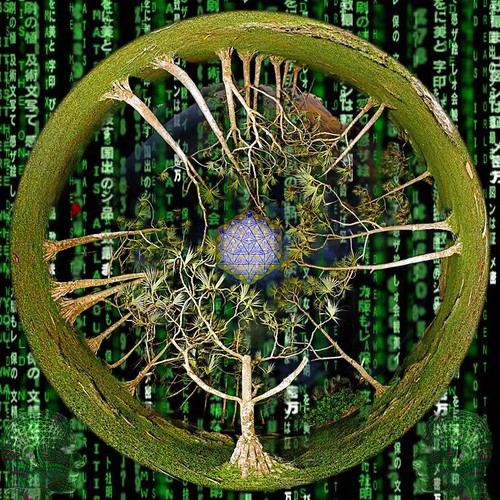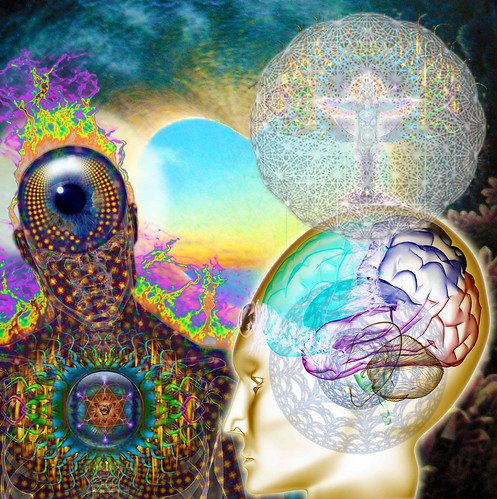Forget Space-Time: Information May Create the Cosmos
By Robert Lawrence Kuhn
What are the basic building blocks of the cosmos? Atoms, particles, mass energy? Quantum mechanics, forces, fields? Space and time — space-time? Tiny strings with many dimensions?
A new candidate is "information," which some scientists claim is the foundation of reality. The late distinguished physicist John Archibald Wheeler characterized the idea as "It from bit" — "it" referring to all the stuff of the universe and "bit" meaning information.
It's no revelation that information is changing society. What's novel is that information is changing science. So, the question then becomes how to understand "information," a common term whose technical or scientific sense can be disruptive.
Information has multiple meanings: facts or knowledge (things one can learn); a measure of difference or surprise (how much one learns); one of two opposite states (on-off, yes-no, one-zero); the mathematical description of a communication system; the content of computation; quantum entangled states (enabling vast computing power); and power to explain and possibly to cause. [National Geographic: First Glimpse of the Hidden Cosmos ]
So here's the deep question: Is information the ultimate constituent from which the cosmos is constructed? I started as a skeptic. Information as reality seems so outlandish, so trendy — a metaphor on steroids.
But here's how physicist Paul Davies, director of BEYOND: The Center for Fundamental Concepts in Science at Arizona State University, frames the question: "Historically, matter has been at the bottom of the explanatory chain, and information has been a sort of secondary derivative of it," Davies said. Now, he added, "there's increasing interest among at least a small group of physicists to turn this upside down and say, maybe at rock bottom, the universe is about information and information processing, and it's matter that emerges as a secondary concept."
The
universe written in binary
Seth Lloyd, an MIT professor specializing in quantum information, defends this idea by likening the universe to a computer, "a physical system that breaks up information into bits, and flips those bits in a systematic fashion."
He explained that electrons have spins, which are described by the laws of quantum mechanics. Electrons can take only two distinguishable values: spinning up or spinning down — the same binary characters as computer bits. So, at rock bottom, Lloyd said, the universe consists of information; every elementary particle carries information.
"So, what is the universe?" Lloyd asked. "The universe is a physical system that contains and processes information in a systematic fashion and that can do everything a computer can do."
To Lloyd, information is not just a way of appreciating or approximating how the universe works, but the literal, most fundamental way it actually works. He sees the universe not like a computer as an explanatory metaphor; it really is a computer as scientific fact. As such, he claims that all changes in the universe are "computations."
The claim is monumental.
 To Raphael
Bousso, a string theorist at the University of California, Berkeley,
information is not just a tool of measure — it is a primary constituent of what
is happening in the world. Information, Bousso said, is not so much
"modeling the system" — it is the
system. Reality won't work, he stressed, unless information is, in some sense,
real.
To Raphael
Bousso, a string theorist at the University of California, Berkeley,
information is not just a tool of measure — it is a primary constituent of what
is happening in the world. Information, Bousso said, is not so much
"modeling the system" — it is the
system. Reality won't work, he stressed, unless information is, in some sense,
real.Think of an ocean wave crashing on the shore, Lloyd said. "Every molecule of water — by its configuration, by its rotation, by its position relative to other water molecules — carries with it bits of information," Lloyd explained. "And then whenever any two water molecules collide, they change by processing those bits of information." Think of each water molecule as essentially instructing other water molecules what to do, combine countless molecules interacting with one another, and you have a wave, he said.
While there is general agreement that information plays a role in all that happens in the cosmos, it is still a minority view that it is more fundamental than physics.
Physicist Stephen Wolfram, founder of Mathematica and Wolfram Alpha, calls information "the most prominent thing of our times" and posits that "simple rules… generate what we see in nature." He described "an ultimate representation of the universe" in terms of "simple rules," which "govern fundamentally" and are "best conceptualized in terms of computation." Although he said simple rules may be more fundamental than mathematics, "it is not the case that "each electron is running an object-oriented program that interacts with other programs. "Recognizing the difference between models and reality, "We shouldn't imagine that the actual way that the universe works is by the operation of similar programs running in each particle," Wolfram said.
Extraordinary
claims require extraordinary proof
To Alan Guth, one of the founders of contemporary cosmology and a theoretical physicist and cosmologist at MIT, the notion of information as fundamental is not convincing — at least not yet.
"I don't see justification for the claim," Guth said, "although maybe I could be convinced in the future. Unless those bits are doing something different from the laws of physics, I don't really see that there's a question here. If two things are equivalent, I don't think there's any valid way to talk about which is more fundamental, and I see the two as equivalent."
I like Guth's balanced approach that describes matter energy and information as almost identical. That's partly why he can entertain the possibility that our universe could be a simulation, running on some cosmic computer, he told me.
I agree. If information is primary and the universe is fundamentally a computer, then it should be at least theoretically feasible, in principle, to simulate whole worlds on future supercomputers. Hence, we could not now reject the possibility that our universe is a simulation.
There is a further consequence. A simulated universe, fully formed like ours, would confirm reductionism — the idea that everything, including consciousness, could be reduced to physics, even to digital events. (Personally, I think this outcome is unlikely — I do not see consciousness, inner experience, being fully explained in terms of fundamental physics — though I'll leave it a matter for future discourse.)
Could these theories that give information pride of place — however abstract and even bizarre — ever be tested? Even if the universe were a simulation, simulations are never perfect, so it might be possible to detect, at extreme levels of precision, fuzziness, glitches or even errors in the fine measurements of physics, such as drifts in core constants (e.g., the speed of light).
If information were fundamental, there should be ways of using information to improve the Standard Model of fundamental physics, which, although highly successful, has multiple free parameters so far without demonstrable, underlying coherence. Other possible tests of information as fundamental might include confirming the theory that the universe is like a hologram (a 3D image projected from a 2D source) and that space is not smooth and continuous but gridlike and discrete (like information).
So the question is a real one: In the grand chain of existence, is information bedrock?
Copyright
2015 SPACE.com
For more information about the information cosmos see http://nexusilluminati.blogspot.com/search/label/information%20universe
- Scroll down
through ‘Older Posts’ at the end of each section
Hope you like this
not for profit site -
It takes hours of work every day by
a genuinely incapacitated invalid to maintain, write, edit, research,
illustrate and publish this website from a tiny cabin in a remote forest
Like what we do? Please give anything
you can -
Contribute any amount and receive at
least one New Illuminati eBook!
(You can use a card
securely if you don’t use Paypal)
Please click below -
Spare Bitcoin
change?
Xtra Images by R. Ayana – https://farm6.staticflickr.com/5490/10572282704_4b31e92d92_k.jpg
For further enlightening
information enter a word or phrase into the random synchronistic search box @
the top left of http://nexusilluminati.blogspot.com
And see
New Illuminati – http://nexusilluminati.blogspot.com
New Illuminati on Facebook - https://www.facebook.com/the.new.illuminati
New Illuminati Youtube Channel - http://www.youtube.com/user/newilluminati
New Illuminati on Google+ @ For
New Illuminati posts - https://plus.google.com/u/0/+RamAyana0/posts
New Illuminati on Twitter @ www.twitter.com/new_illuminati
New Illuminations –Art(icles) by
R. Ayana @ http://newilluminations.blogspot.com
The Her(m)etic Hermit - http://hermetic.blog.com
DISGRUNTLED SITE ADMINS PLEASE NOTE –
We provide a live link to your original material on your site (and
links via social networking services) - which raises your ranking on search
engines and helps spread your info further!
This site is published under Creative Commons (Attribution) CopyRIGHT
(unless an individual article or other item is declared otherwise by the copyright
holder). Reproduction for non-profit use is permitted
& encouraged - if you give attribution to the work & author and include
all links in the original (along with this or a similar notice).
Feel free to make non-commercial hard (printed) or software copies or
mirror sites - you never know how long something will stay glued to the web –
but remember attribution!
If you like what you see, please send a donation (no amount is too
small or too large) or leave a comment – and thanks for reading this far…
Live long and prosper! Together we can create the best of all possible
worlds…
From the New Illuminati – http://nexusilluminati.blogspot.com


No comments:
Post a Comment
Add your perspective to the conscious collective